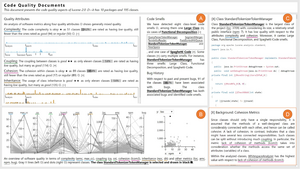The Research Group is Moving!
During winter term 2021/22, we move to University of Bamberg. From Oct. 15, 2021, Fabian Beck holds a full professor position on Information Visualization.
New webpage of the research group: https://www.uni-bamberg.de/vis
Publications
Publications of the research group since 2016. For earlier publications, please visit Fabian Beck's Google Scholar or DBLP profile.

Type of Publication: Article in Journal
Exploranative Code Quality Documents
- Author(s):
- Mumtaz, Haris; Latif, Shahid; Beck, Fabian; Weiskopf, Daniel
- Title of Journal:
- IEEE Transactions on Visualization and Computer Graphics
- Volume (Publication Date):
- 26 (2020)
- Number of Issue:
- 1
- pages:
- 1129-1139
- Keywords:
- Code quality, interactive documents, natural language generation, sparklines
- Digital Object Identifier (DOI):
- doi: 10.1109/TVCG.2019.2934669
- Fulltext:
- Exploranative Code Quality Documents (2.22 MB)
- Talk associated with this publication:
- IEEE VIS 2019
- Recording:
- https://vimeo.com/370669433
- Citation:
- Download BibTeX
Abstract
Good code quality is a prerequisite for efficiently developing maintainable software. In this paper, we present a novel approach to generate exploranative (explanatory and exploratory) data-driven documents that report code quality in an interactive, exploratory environment. We employ a template-based natural language generation method to create textual explanations about the code quality, dependent on data from software metrics. The interactive document is enriched by different kinds of visualization, including parallel coordinates plots and scatterplots for data exploration and graphics embedded into text. We devise an interaction model that allows users to explore code quality with consistent linking between text and visualizations; through integrated explanatory text, users are taught background knowledge about code quality aspects. Our approach to interactive documents was developed in a design study process that included software engineering and visual analytics experts. Although the solution is specific to the software engineering scenario, we discuss how the concept could generalize to multivariate data and report lessons learned in a broader scope.
